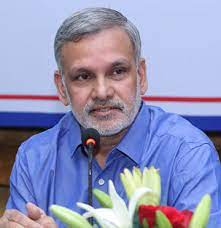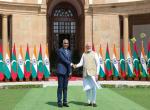While more than sixty countries around the world will conduct democratic elections in 2024, currently it is the US Presidential election that is under the spotlight of the international community. Every fourth year, Americans vote for the occupant of the Oval Office in the White House. The victor can be the incumbent elected for a second term or a new winner in the election.
The current election in the US is watched more intensely by the international community for several reasons. First of all, it is going to be a contest between the incumbent president and his predecessor. After decades, a former president who lost the election after serving four years is yet again contesting election to serve a second term in the White House.
Secondly, both the presidential candidates are of considerably advanced age, many ordinary American citizens desired fresh faces for the contest but their expectations are belied. Thus, there are many Democrats who do not like a second term for Joe Biden but will vote for him because they dislike Donald Trump more. Likewise, many Republicans may not like Trump’s candidacy, but they would vote for a relatively younger Trump as against Joe Biden.
Third, the democratic countries are closely monitoring how the American voters are going to choose their next president in the backdrop of a candidate who is facing four criminal charges and has already lost two civil cases and is in the process of going for an appeal.
Fourth, there is palpable anxiety over the outcome of the 2024 US presidential race in countries allied to the United States as well as in countries having adversarial ties with the United States. This uneasiness among the friend and foes of the US is derived from the fact that Trumpism in the US was not a one-time phenomenon and there is a reasonable possibility of return of Donald Trump to the White House.
Among the American allies, the NATO member countries are displaying disquiet not only because President Trump undermined the alliance during his term in the White House but also because he has made uncharitable remarks on NATO during the current election campaigns. Denigrating the NATO members who do not contribute 2 per cent of their GDP to defence is hurtful, but statement by Trump that he would allow Russia to “do whatever the hell” it wants with such member countries has created a fear psychosis in Europe. More worrisome was the silence of the other Republican leaders who did not prefer to counter Trump. Although Trump clarified later that he would not make the United States withdraw from NATO, it was no solace. Without the backing of the US Senate, no president can withdraw from NATO. But there are many other ways an American President can disrupt the functioning of the alliance. There are also concerns that the extended US nuclear deterrence over Europe may develop holes leading to suggestions that the European nuclear weapon powers, such as UK and France together create a separate command to ensure European security. Germany once approached France for be part of the French nuclear command and Paris declined. Recently France toyed with such an idea, but Germany has given cold shoulder. There are talks about restoring the old Weimar proposal to set up a triangular relationship among France, Germany and Poland.
Russians and the Chinese too are cautiously monitoring the US election campaigns. If Biden wins, there will be little surprise. If Trump wins, no one can be certain about his approach to the Ukraine War, Taiwan Strait tensions, or even the Israeli war against the HAMAS. Trump has claimed that he can end the war in Ukraine even before his inauguration! Moscow is curious and Kiev seems terrified.
How Trump 2.0 will address the issue of North Korean WMD belligerence is another unknown, and the Indo-Pacific countries, especially Japan and South Korea too seem to be eagerly watching the US election debates. Whereas Trump during his term in the White House had asked Japan and South Korea to defend themselves thus raising suspicion over the trustworthiness of the extended nuclear deterrence, President Joe Biden successfully signed the Camp David Agreement by bringing South Korea and Japan together. Will Trump resume contact with the North Korea strongman or respect the Camp David agreement? Trump, moreover, has high praise for Chinese President Xi Jinping, but he has threatened more than 60 per cent of tariff on Chinese goods entering the US. It was former President Trump who started an economic Cold War with China. Current President Biden did not end the economic cold war, but made US-China relations more conflict prone by blowing hot and cold on the Taiwan issue.
In the midst of the US presidential election, the security scenario in the Indo-Pacific is currently unstable and conflict prone. China’s repeated violation of Taiwan’s airspace and threatening military postures, Sino-Philippines tension over sovereignty issue in South China Sea, quadrilateral naval exercises by American, Japanese, Australian and Filipino navies, China’s confrontational approach through naval drill of its own at the same time in the waters of South China Sea and several other developments point to the importance of who wins the US presidential race and how things may evolve, especially the future trajectory of QUAD, AUKUS and Indo Pacific Economic Framework. China has taken very seriously the recent Quadrilateral naval exercise and the reported expansion of AUKUS to include Japan.
Similar, and perhaps more dangerous, developments in West Asia too making the regional countries sit up and curiously watch the US election-related developments. Israel’s war against HAMAS has gone on for about six months with no end in sight. American public opinion, the UN Security Council resolutions and international public opinion have not made any impact on Netanyahu’s war goals. While the energy market still appears stable, will it continue to remain so? The Yemeni Houthis’ attacks on commercial shipping in the Red Sea, potential armed conflict between Iran and Israel and the emotional impact of the plight of the innocent Palestinians in the Arab world carry considerable risks for stability in the region. Will the situation improve for good or get worse after the US election is a question that is raised in many capitals.
India has also been quietly yet carefully watching election scene in the United States. There is a discernible confidence among the attentive members of Indian foreign policy and strategic community that the outcome of 2024 US presidential election is unlikely to fundamentally alter India’s bilateral relations with the United States. The strategic partnership between the two countries have come a long way, has matured over the last two and half decades and the occasional hiccups are unlikely to derail the US-Indian relations. Donald Trump has mercurial personality. But Prime Minister Narendra Modi could successfully navigate the country’s policy with the US during the Trump Administration. The US-Indian relations remain robust under Biden Administration despite differences over the Ukraine War, oil purchase from Russia and issues related to declared anti-India terrorists operating in North America. The bipartisan support India enjoys in the US Congress is also strong and durable.
Yet, India is weighing the consequences of the outcome of the US elections, because of the potential ramifications of the foreign and national security policy of the next US Administration—Biden or Trump-- on India’s global engagements. India and the United States are part of evolving multilaterals and mini-laterals in the world, more particularly in West Asia and the Indo-Pacific and it is to be seen how the next US President is going to handle its affairs with such bodies, such as Climate Accords, Indo-Pacific Economic Framework, India, Middle East, Europe Economic Corridor, I2U2, QUAD and AUKUS.
(The paper is the author’s individual scholastic articulation. The author certifies that the article/paper is original in content, unpublished and it has not been submitted for publication/web upload elsewhere, and that the facts and figures quoted are duly referenced, as needed, and are believed to be correct). (The paper does not necessarily represent the organisational stance... More >>
Image Source: https://media.cnn.com/api/v1/images/stellar/prod/20240409-joe-biden-donald-trump-split.jpg?c=16x9&q=h_833,w_1480,c_fill











Post new comment